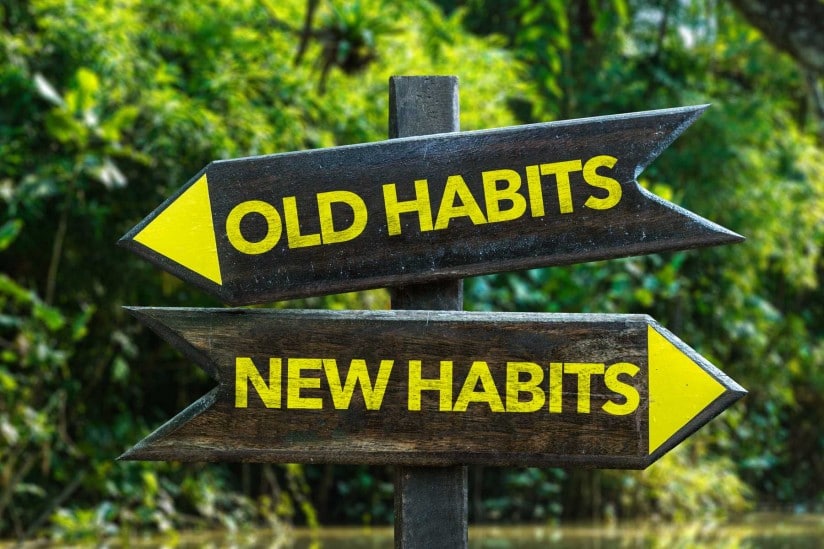Happy New Year 2020 everyone! This is my first entry of the year after taking a little hiatus to regroup and restore last quarter 2019.
As some of us assess our accomplishments, goals, desires and things we want to have or change in the future for this new decade, I wanted to touch on the infamous New Year resolution, intention or simply a habit that you have been trying to break for years now. Did you know that less than 8% of people with a resolution are successful at sticking to it? That leaves the rest of the population that set goals for themselves somewhat self slighted and defeated if they could not stick with their plan. During the last couple of years now, I’ve worked with clients that have dealt with addictions such as binge eating, alcohol, sugar, caffeine, negative self-talk and the list can go on and on. It can be such a frustrating cycle accompanied by the feeling of shame each time you cannot stop yourself from resuming an unwanted habit or behavior. It can drain your self-esteem, your emotional and physical health and even affect those around you as well. The truth is, there are so many dimensions that can be addressed to support the causes of relapse for any type of behavior and we have heard of so many emotional and spiritual concepts, especially those along the lines of making a ‘choice’ to change or ‘willpower is entirely in your hands’ simply does not work on it’s own for some individuals. The truth is, if you have created a habit that has been going on for most of your life or even just for a couple of years or months, it quite literally changes your brain chemistry, which changes your cellular function, which changes how you feel. This isn’t so easy to reverse – but it’s totally possible and attainable.
First, you definitely want to want the change. Second, we want to create a plan that supports that change emotionally and physically. For the sake of this entry, I wanted to focus on the physical components to quitting a habit. Let’s look at physical health and what happens with any type of addiction; sugar, for instance. If you are hooked on sugar and have been training your body and mind that this substance is part of your reward system, this changes or even depletes your feel good neurotransmitters such as dopamine, serotonin and GABA receptors, just to name a few. On top of that, if you have been eating copious amounts of sugar for years, your liver slows down detoxification lacking conversion of some nutrients and hormones to distribute to your cells leaving you feeling rundown and sometimes anxious or depressed and in return, your cells and body are screaming for that one thing that made you feel good in the first place. I should also mention, that most addictions are based off of emotional stress or learned behaviors stemming from stress early as childhood or as recent as a last week’s 80-hour work week, which is why I want to also stress that working with a practitioner or therapist that can get to the root of your addiction is the other most important piece of the puzzle to getting underneath unlearning behaviors. It’s sometimes not fun to look at, but I say, if it’s worth your mental and physical health, move through it and you will be rewarded with what is on the other side. To my point, emotional stress typically breaks down our body’s ability to absorb nutrients and becomes depleted of certain amino acids that actually aid in our coping mechanisms. So how can we support our physical health when ditching those unwanted habits.
For instance, if we are craving sugar it can indicate that we need an endorphin rush since we are not producing enough on our own, a feel good rush, sometimes to numb our anxiety, stress or sadness. This usually goes hand in hand with carbohydrates in general, caffeine, alcohol, or tobacco; substances that we want to quit or control and have a hard time doing so. In times of chronic stress, grief and loss, these endorphins are dramatically reduced and can trigger relapses of all kinds. Sugar, just like any drug can also perpetuate the waves of cyclical blood spikes ensuring a surge in energy or ‘happiness’ and a super low drop to sadness and depression. For this reason, before anything else, it’s important to assess your diet before quitting any type of substance or habit ensuring you have the proper macronutrients for your body overall.
So what are amino acids and which can help support your new resolution or intention?
Amino acids, often referred to as the building blocks of proteins, are compounds that play many critical roles in your body. They’re needed for vital processes like the building of proteins and synthesis of hormones and neurotransmitters. Both animal and plant proteins are compromised of a combination of approximately, 20 amino acids. The following below are indicative to support neurotransmitters:
DL-phenylalanine is an amino acid that extends the life of pain-relieving chemicals called endorphins. DLPA is a powerful pain reliever without being a stimulant. Once we quit something so powerful such as sugar or cigarettes, or alcohol, guess what is depleted? Endorphins. Dopamine. Serotonin. DLPA can support your biochemistry to actually reduce cravings for numbing foods and substances.
L-Tryptophan and 5-HTP are used to manufacture serotonin, the brain’s natural antidepressant. Deficiency in these amino acids can manifest as anxiety, depression, panic and irritability, compulsive thoughts, leading to caving into cravings that worsen in the afternoon or evening. These can also be taken to support your system while quitting a substance or to boost general well-being that can get you over the hump of any type of withdrawal or craving.
L-Tyrosine manufactures catecholamines such as dopamine, norepinephrine, and epinephrine. These neurotransmitters as mentioned earlier, cause us to wake up in the morning, refreshed and with a clear mind. Catecholamine deficiency may include fatigue, lack of focus and motivation. This is another deficiency that can cause cravings of sweets and starches for that quick spike in blood sugar and temporary stimulation. This deficiency may be most difficult for those who want to quit smoking, caffeine, sugar or anything stimulatory that raises catecholamine levels.
GABA is a neurotransmitter that acts on anxiety, tension, emotionally and physically and feeling overwhelmed by stress. When we want to relax and reach for carbohydrates, nicotine or alcohol, this can be a deficiency in GABA, especially if we have had bouts of chronic stress. There is some debate if taking GABA crosses the blood-brain-barrier to actually absorb into the enteric nervous system; however, this has also been contradictory as some evidence shows that oral supplementation with GABA does produce a calming effect. It is just not completely proven that this can be a placebo effect or actually work for some individuals and not for others. I really like the use of L-Theanine in place of GABA to start.
Of course, without working with a practitioner or proper testing, it’s hard to say what you may or may not be deficient in, but there are subtle or obvious signs and symptoms that could indicate trying combinations of specific amino acids and with specific doses. Many of these amino acids are given to individuals with opiate addictions and have had amazing benefits with these alone to have successful recovery rates and to feel so much better. In combination with a pro-recovery diet in combination with stress management, an amino-neurotransmitter program can permanently optimize the brain’s natural ability to generate pleasure, positive moods, sleep, and energy.
I hope this can help as part of your action plan to achieve kicking that unwanted behavior or habit once and for all this year or simply taking a break from substance to assess what it is your body is lacking and needing. As an extra perk, when we stick to a commitment our self-confidence skyrockets and our overall wellbeing gains traction. That is tough to beat!
If you’re looking to work with a plan for yourself and don’t know where to start, please contact me for a consultation at info@nataliesteiner.com! I’d love to hear from you!
Xo
Natalie
References:
- E. Boonstra, R. de Kleijn, L. Colzato. Neurotransmitters as food supplements: the effects of GABA on brain and behavior. Frontiers Psychology. 2015.
- J. Ross. www.allianceforaddictionsolutions.com. 2020.
- A. Gutierrez-Preciado, B.Sc, H. Romero, B.Sc. An Evolutionary Perspective on Amino Acids. Nature Education. 2010.

